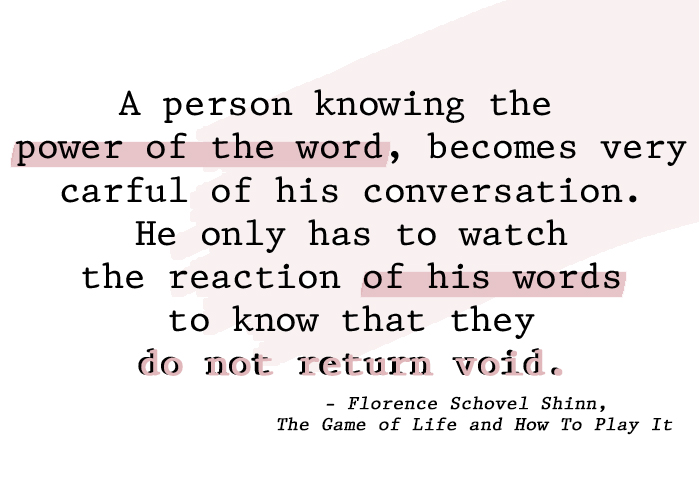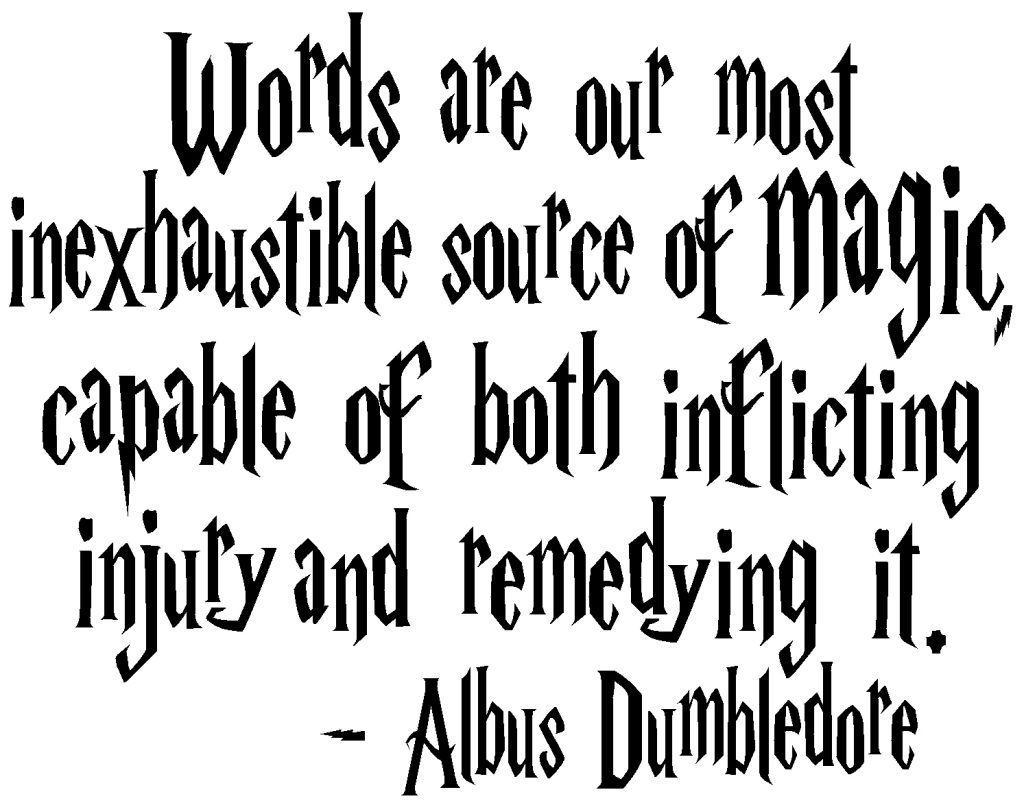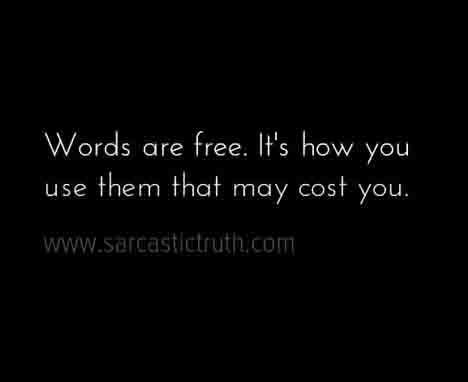It’s only words!! As far as ‘bromides’ go in the English language, that has to be one of the worst ones.

Most people will have come across the term ‘bromide’ in relation to the chemical compound potassium bromide; a sedative preparation. The term ‘bromide’ is also applied to words trying to achieve the same effect, so a ‘bromide’ is; a trite statement that is intended to soothe or placate.
That fully illustrates that it is never ONLY words. It’s only words? – that is a trite statement that is intended to soothe or placate. It’s only words? – that is a bromide if ever I heard one. That one word ‘bromide’ has just replaced 10 words; it has the POWER OF 10. Words are never an ‘only’, words are powerful.
If words are powerful that means that they have power; once you have spoken a word you have created the energy of the meaning behind it. You have released that energy into the universe and let it fly free. Where it goes from there you may have very little control over.
The one thing that you can never do when a word has been spoken is ‘unsay’ it. You can usually be assured that if somebody is saying ‘It’s only words’ that they are trying to diminish the repercussions upon themselves of having said something that was hurtful or intending to cause injury. It is a get-out clause used by ‘playground bully’ personalities. The modern day counterpart is the use of ‘only/just saying’ at the end of a statement.
So what is this power that words have? The interesting thing about words is that they only gain their power when they are used (spoken or written), the type of power they hold also depends on the context in which they are used, the intention behind their use and the way in which they are delivered. Sneaky little blighters are words; there are just so many different ways in which to say them; that is also part of their power.
The sheer number of words that exist purely as descriptions of the way in which words can be delivered or used demonstrates that we underestimate their power at our own peril.

Words can take on many different properties; they can be sharp (of a remark: it cut like a knife), they can be soft or gentle (as in whispering in someone’s ear), they can even be sugar-coated. What decides the properties, context, intention and way of delivery is the orator.
As our primary method of communication and expression our choice of words is also essential, get the wrong one and we can end up saying the opposite of what we mean or worse.
Say What You Mean and Mean What You Say
That was one of my Gran’s more common sayings and was firmly part of the backbone of the Old Ways. She knew the power of words and the importance of not saying anything that you didn’t mean. And equally the importance of really meaning that which you did say.
Gran knew that as words fly from your mouth they carry the energy of your intentions. And that energy, causing the air through which it travels to vibrate, radiates in all directions. The spoken word causes the vibration and the intention it is imbued with creates effects. Experiments have been done to examine the actual physicality of this; see Dr. Masaru Emoto’s experiments with water.
Gran lived by this rule (I try to). Because as soon as words are spoken the energy is set in motion and it doesn’t have a brake. If what was said wasn’t meant, it is too late, the damage is done. ‘Sorry I didn’t mean that’ cannot retract it or fix any damage.
Your Word is Your Bond
The Old Ways recognised the true power that words have, today we seem to have forgotten. As a result we lay up all sorts of trouble for ourselves. Our world may have changed, but the importance of integrity has not. Making an agreement verbally means that whatever is agreed to is ‘set in stone’. Elements of nature; trees, stones etc. have always been recognised as ‘witnesses’ to the words that we speak. Something else that we seem to have forgotten in our modern lives.
This knowledge is recorded in the Bible (as much as I dislike quoting the Bible). In Joshua 24:27, Joshua says to the people “this stone shall be for a witness against us, for it has heard all the words”. And in the new testament Jesus is recorded as saying “if they [His disciples] keep quiet, the stones will cry out”. The Ankerwycke yew at Runnymede, officially bore witness to King John signing the Magna Carta in 1215.
In the ‘Stone Tape Theory’ (popular in paranormal culture), it is the crystalline structures within stone and rock that are believed to be capable of storing energy. The spoken word travels in the energy form of a sound-wave. Whilst this theory has been dismissed by science in the past scientists at the University of Southampton have now, using nanostructured (similar to crystalline-structure) glass, developed the recording and retrieval processes of five dimensional (5D) digital data. This has unprecedented properties including 360 TB/disc data capacity, thermal stability up to 1,000°C and virtually unlimited lifetime at room temperature (13.8 billion years at 190°C ).
When we verbally make an agreement, say that we will do something it truly is ‘set in’ stone. If we don’t deliver on what we have agreed the other person/people may feel aggrieved at being let down. We may get a reputation as being unreliable. This is negligible in comparison to what ‘Otherworld’ may return to us in energy form. Carefully consider what you are agreeing to and how you word that agreement. You are being recorded and the universe will hold you to it. Your word is your bond.
Spell it Out

‘Spell’ used as a verb meaning ‘to enunciate the letters making up a word’ first appeared in English in the 14th century, borrowed from the Old French ‘espeller’, and originally meant ‘to read out, to study intently’. The root of that Old French ‘espeller’ was the ancient Germanic root ‘spell’, which also gave us the ‘magic’ sort of ‘spell’.
Whether you are speaking whether that be in the sense of enunciating words or in the sense of delivering an incantation, you are constructing meaning and delivering it. In both uses you are doing the same thing. You are using words to express your intentions and direct their energy to achieve a particular outcome. Words cast spells (that is why it is called spelling), words are energy, use them wisely.
A last word of warning. Remember the ability of words to bounce. Whether it is caused by them hitting something that forms the shape of an amphitheatre and creates the effect of an echo, or them hitting someone else’s protective barrier designed to send things back to source. Words have a nasty habit of coming full circle and biting you on the rump.

Nicely thought out and relevant piece Tan. As I write it’s Thursday 14th Dec. I’m reading that some of the Tory MPs who voted against their whip last night have received death threats for opposing their party. Some of these have been passed on to the Police. It wasn’t long ago that Jo Cox was murdered in cold blood by someone who simply opposed her point of view.
Words are indeed very powerful. What we say often reflects our beliefs, opinions and what we stand for. They also say what we are against. They can be held against us at some future date, or used in support of us.
Using them wisely has to be the correct method. But wisdom only comes with longevity, and sometimes not even then. The internet age is fantastic, but it’s so easy to see what so and so said 20 years ago and use those words against him or her now when they may well have totally different views. It’s a tricky one, we can’t all just be quiet and not say anything, yet if we do say something we may be damned in the future.